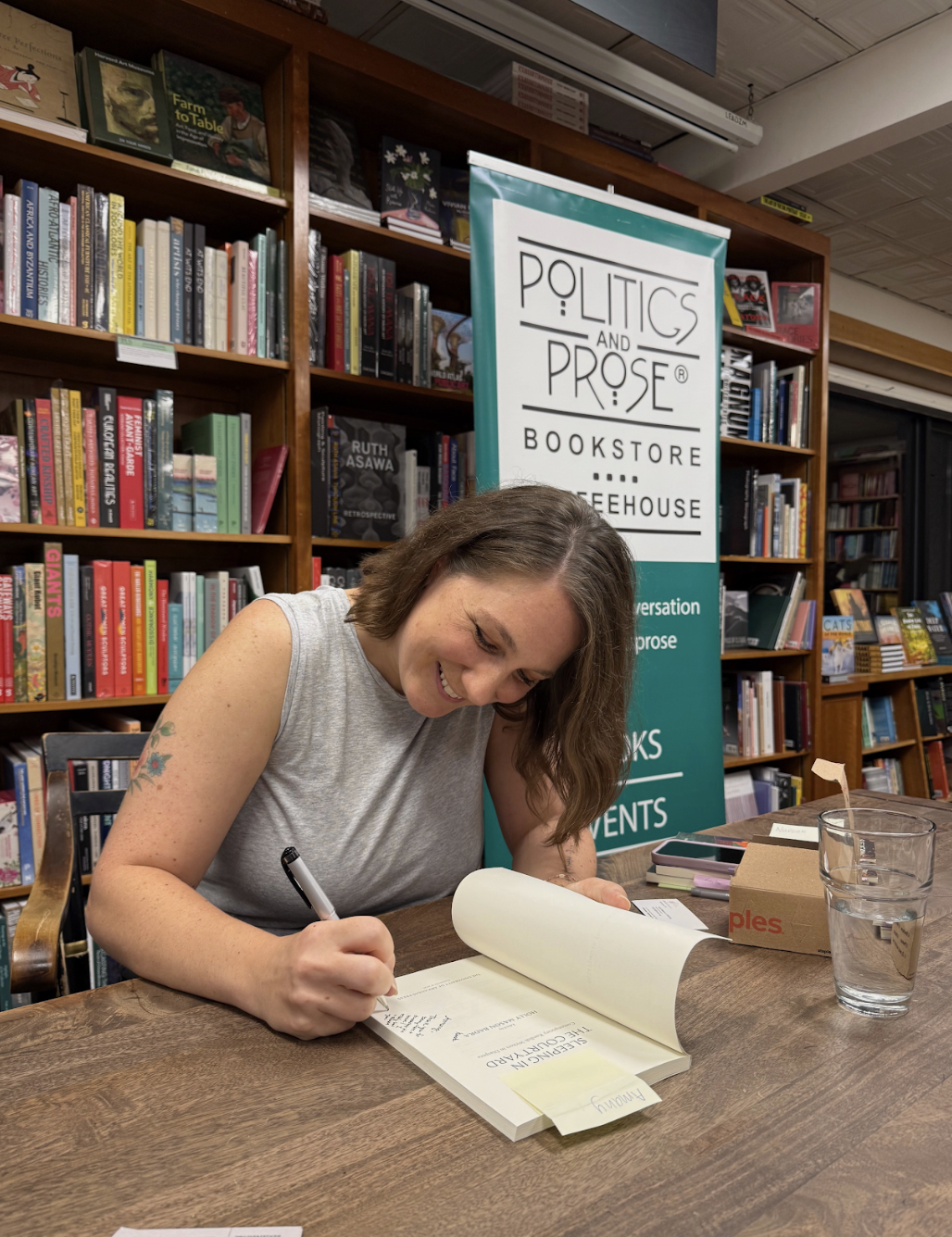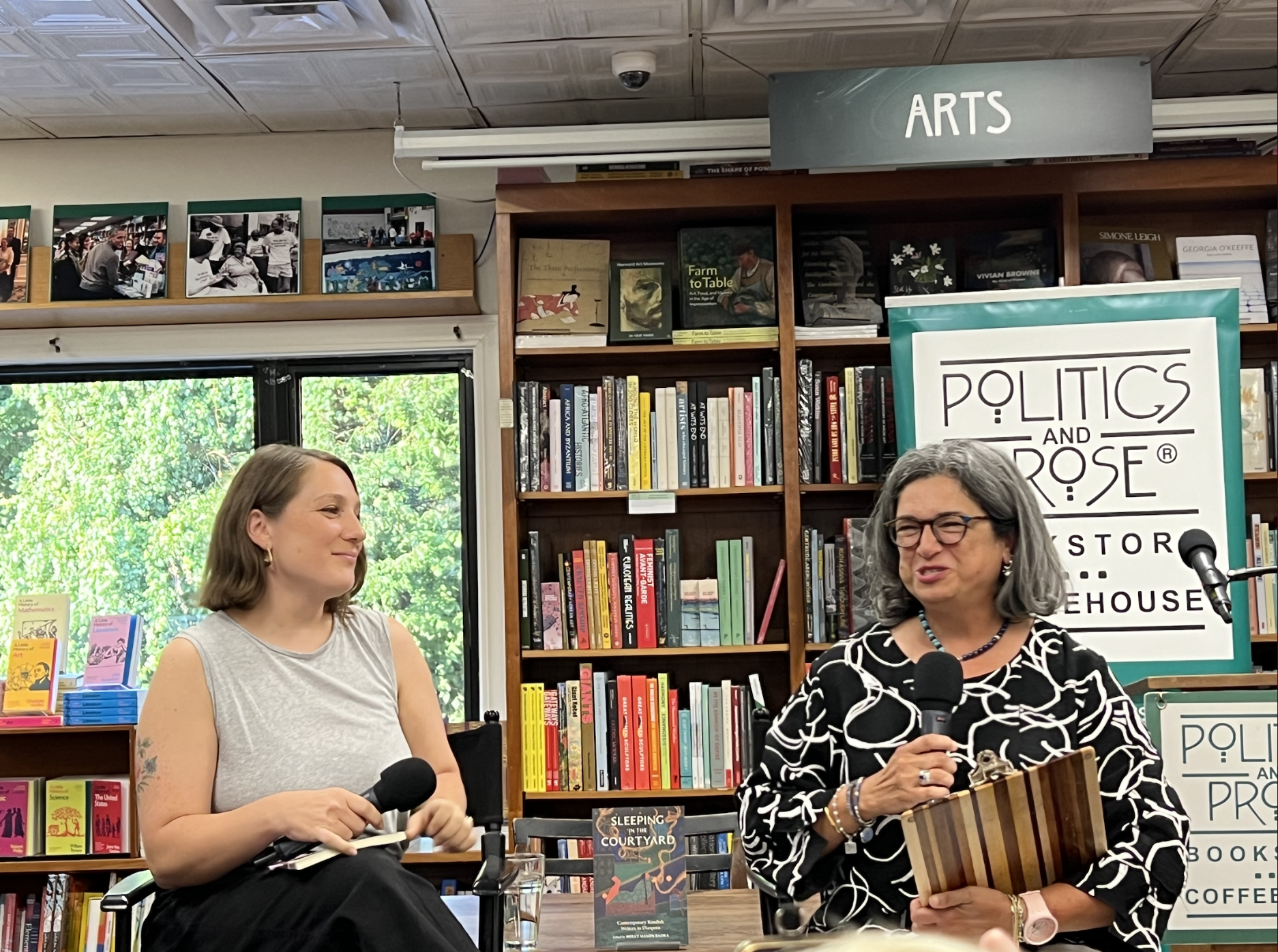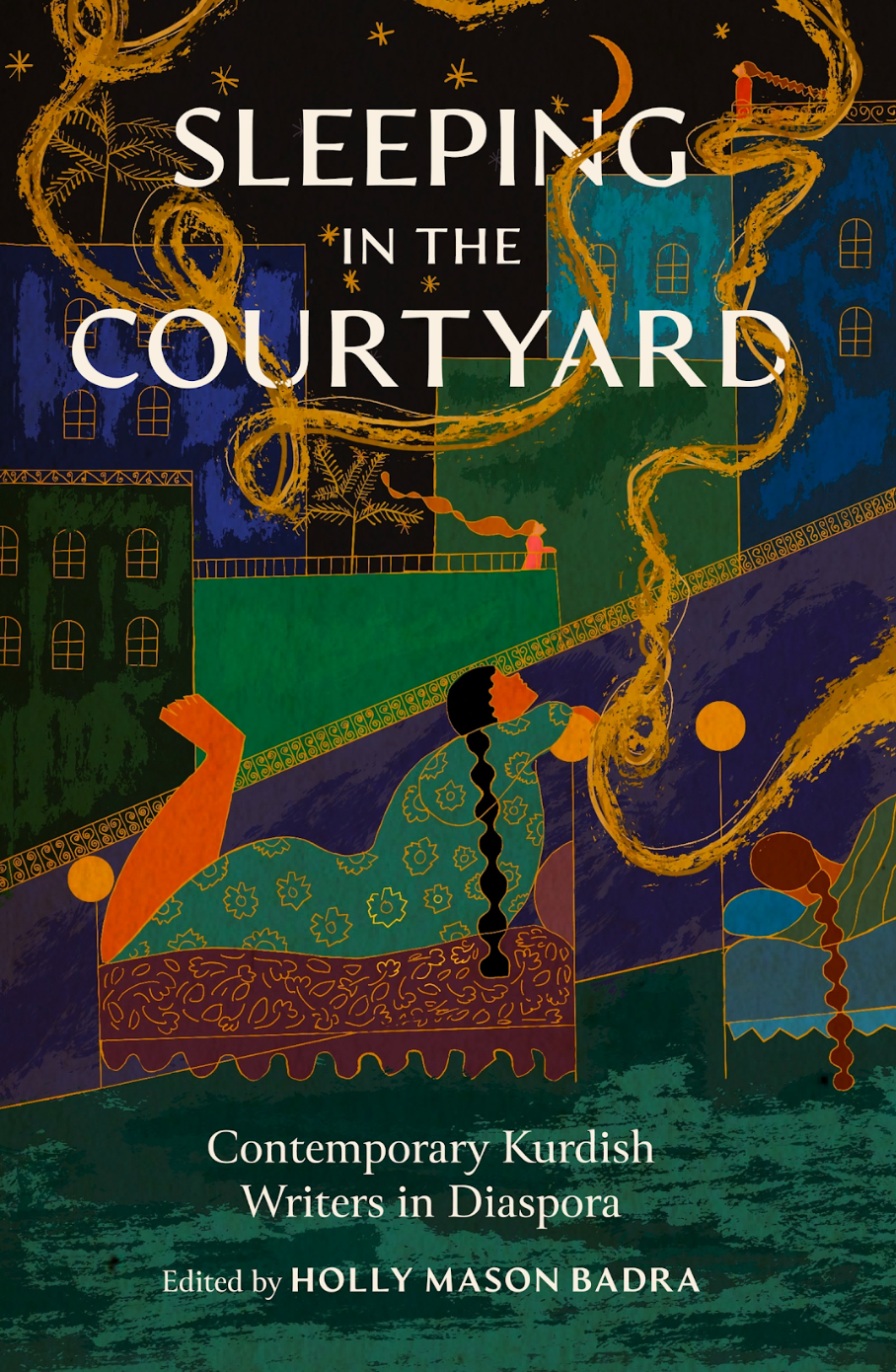Holly Mason Badra is a Kurdish American writer and scholar born and raised in Charlotte, North Carolina. She earned a bachelor’s degree in English with a minor in dance from the University of North Carolina at Greensboro. After spending a year in Australia, she returned to the United States to pursue creative writing, graduating with an MFA in poetry and a graduate certificate in higher education administration from George Mason University (GMU).
Since then, Holly has taught undergraduate classes in English, creative writing, literature, humanities, and women and gender studies. Her poetry, nonfiction, reviews, and interviews have been published in various online and print journals. Currently, she serves as the Associate Director of Women and Gender Studies at GMU and resides in Northern Virginia. Recently, she shared her thoughts with Kurdistan Chronicle.

Kurdish roots
“My mother was born in Kirkuk and grew up in Baghdad. Her parents are both Kurdish; we are part of the Khoshnaw/Mirran family,” Holly explained.
“In 1975, they escaped what they knew was coming from Saddam Hussein. My mother’s cousin, for instance, was forced to become a body double for Uday Hussein, Saddam’s eldest son. So they left, staying with relatives in Erbil before coming to the United States as refugees.”
The family first arrived in New York and eventually settled in North Carolina, also living in Nashville and Texas. “My mother met my father, a southern boy from Nashville, Tennessee, and that’s how I came to be,” she said.
I asked Holly how she feels about being half Kurdish and whether her Kurdish identity has influenced her work or research. “I’m so proud of my Kurdish identity,” she reflected, nothing that “growing up in my big, loud Kurdish family was such a gift. My cousins are more like siblings to me, and my aunts and uncles are more like mothers and fathers.”
For Holly, being half Kurdish and growing up in the United States without having traveled to Kurdistan or being fluent in Kurdish sometimes evokes sadness for what she feels she is missing.
“My Kurdish identity, especially living in the diaspora, has deeply influenced my work and research. I focus on Kurdish women writers and their experiences as written or translated into English,” she stated. These works have provided her with a window to her roots in many ways. “It’s important to me that there’s a wider understanding of who the Kurds are, as well as their culture, art, and literature,” she underscored.
Holly also brings the knowledge she gained from her mother into her classes, including her current course, Global Representations of Women. “I often ask my students how many have heard of the Kurds, and each semester, only one or two students out of 30 raised their hands. My class then changes this narrative so that all 30 leave with a deeper understanding of Kurdish culture, history, and especially the intersectional experiences of Kurdish women,” she told Kurdistan Chronicle.

Connecting to Kurdistan
Although Holly has yet to visit Kurdistan, she shared that she and her mother had discussed going after her undergraduate graduation, but their plans were postponed due to turmoil in the region. “I don’t plan to go at the moment, as I’m raising a one-year-old and managing work and financial constraints. However, we hope to go as a family once my child is older,” she explained.
Holly has Kurdish friends living in the Kurdistan Region who are eager to host her, as well as others in the diaspora who want her to travel back alongside them. “So, the trip will certainly happen, and I look forward to it with great anticipation. I know I’ll cry a lot when I’m there … tears of various emotions,” she said.
Holly hopes to learn the Kurdish language. “When I was younger, my family spent a lot of time together, so I could understand Kurdish much more. I understood words and phrases from context,” she said. She knows some Kurdish from her upbringing and from time spent with Kurdish friends, and she has taken a couple of short online Kurdish language courses.
Holly recounted a poignant experience: “I was once at a poetry reading in Washington, D.C., where the poet Choman Hardi read all her poems in English. But she read her last poem in Kurdish, and its beauty made me weep. Afterward, Choman asked me why I cried, knowing I didn’t understand every word in Kurdish. I told her that hearing Kurdish brought me warmth and comfort, connecting me back to my childhood and family, while also evoking incredible sadness and isolation for what I don’t know and wish to learn.”
Holly works with many Kurdish students at GMU, and I was curious about their role in representing the Kurdish cause. “I work with Kurdish students often as the faculty advisor of the Kurdish Student Organization (KSO) at GMU. I don’t want them to feel any pressure to represent Kurdistan or the Kurdish cause,” she said. “But I am proud of the deeply rooted desire these students have for spreading awareness, appreciation, and understanding of Kurdish history, culture, and experiences,” she explained.
Throughout the semester, GMU hosts events that allow Kurdish students to feel a sense of pride and belonging while offering the non-Kurdish community a chance to learn and celebrate alongside them.
“I love the students I work with and feel I’m able to make a real impact in this role,” Holly explained.
In addition to working with the KSO students, she is also the associate director of Women and Gender Studies at GMU. “For now, I’m happy to stay in this role. As a writer, I have many goals. I would like to publish my manuscripts in progress, including a book of poetry and a book of nonfiction essays. I also want to continue working with and highlighting the works of Kurdish writers and translators,” she said.

Upcoming projects
I wanted to know more about her upcoming project and whether she has undertaken any other writing projects related to Kurdish topics. “My recently released collection, Sleeping in the Courtyard: Contemporary Kurdish Writers in Diaspora, was published this June by the University of Arkansas Press,” she described. The book features poetry, fiction, nonfiction, and a graphic novel by Kurdish women and nonbinary writers living worldwide. Some works are originally written in English, while others have been translated into English.
The project began in 2019 when Western media highlighted Kurdish oppression through coverage of the Turkish military’s attacks on Kurds in Western Kurdistan (northern Syria). This mainstream coverage led North American and English-reading writers to inquire about where they could find Kurdish poetry and literature translated into English. Holly took on the task of spotlighting what was readily available online, but at that time, there was not a vast amount of Kurdish literary work translated into English, especially compared to translations of other languages from the Middle East, like Arabic, Turkish, or Persian. Additionally, many existing translations predominantly featured male writers.
“I began researching, connecting, and recruiting writers for this project. Since I started, there have been other great collections showcasing the voices of Kurdish women writers and translators in English. We are starting to see great momentum in this area, and I’m excited for Sleeping in the Courtyard to be a part of it,” she added.
Holly aims to bring together a diverse group of writers to spread appreciation and understanding of Kurdish literature and experiences. She emphasizes that Kurdish women are not monolithic. “Yes, there are themes and threads throughout the collection that are representative of shared experiences, but you also see distinct variations reflective of the way Kurdish women exist,” she explained, noting that “there is both great strength and raw vulnerability throughout the collection.”
“What I gained from this book project has been powerful – and that is deep friendships like sisterhood. We are now all connected and able to support each other’s work and lives. That has been one of the most rewarding outcomes of this collection.”
Kurdish women
Given Holly’s background in gender studies, I asked her how she perceives women’s role and rights in the Kurdistan Region, especially with three women in the Kurdistan Regional Government’s Ninth Cabinet and several in parliament, as well as 69 of 270 judges and 59 out of 204 prosecutor generals being women.
Holly believes there is a significant difference between having women’s representation in government and the daily lived experiences of women throughout the region. “From what I’ve uncovered in my research and from speaking with my family and friends, there have been historical markers where women are revered as leaders and innovators. However, there still exist many barriers to autonomy for Kurdish women in some areas,” she explained.
A number of the writers in her anthology are exiled simply for being Kurdish women and daring to write and publish. As Holly pointed out, this indicates that there is not always equity between male and female writers. “In some areas, there have been great strides for women, but in others, there’s still room for improvement regarding women’s rights.”
Holly’s goal is never to “speak for the Kurds” or for Kurdish women but rather to showcase, uplift, amplify, and center a variety of Kurdish women’s experiences and perspectives – within the region and in diaspora. “In that nuance and tapestry, we can achieve the most accurate depictions and understandings of Kurdish women’s issues and empowerment.”
Holly also mentioned her involvement with Henar Press, a new Kurdish-owned and operated U.S.-based publisher dedicated to promoting Kurdish literature and translation in English. She praised Arian Sorani, the founder and editor-in-chief of Henar Press, for his impressive work and mission. The press offers a Kurdish literary database that curates published Kurdish literature available in English, which is a game-changer in making Kurdish literature accessible to readers. “I’m proud to serve on the board of this press in an advisory role, and I look forward to seeing the great works that come out of Henar,” she said.
Finally, I asked Holly how she balances her passion for academia with her hobbies and interests. “The balance is incredibly difficult, especially now that I have a baby to care for. But when I have the time, I love to go on hikes with my spouse. Spending time in nature is very nourishing for my soul. I also love cooking and learning or inventing new recipes. Dill is my favorite herb – I always find a way to incorporate it. Are you surprised?”
Waiting
Holly Mason Badra
Winter branches
Silhouette
the darkening sky.
In trying to be tender,
I slice a pear
and add cinnamon.
The gate swings on a hinge.
Imagine
a crescent moon:
the beloved’s ear.
And in her
eye
a silhouette
of winter branches.
The War Was Over
Nazand Begikhani
Christmas Day
I arrived at my mother’s house
with my four-year-old son
That was their first encounter
My son had seen her photographs
and jumped into her arms
My mother was struggling to hide her tears
No one will know
if they were tears of joy
or of grief for the loss of my brother
who carried the same name
In deep silence
still in her arms
Nawzad smiled and said:
I have missed you Nana giyan
Goran Shakhawan is a Kurdish-American journalist and author based in the United States. He has covered news for several Kurdish news outlets and was a former senior correspondent for Kurdistan24 in Erbil and Washington D.C. He has published several books in Kurdish.

